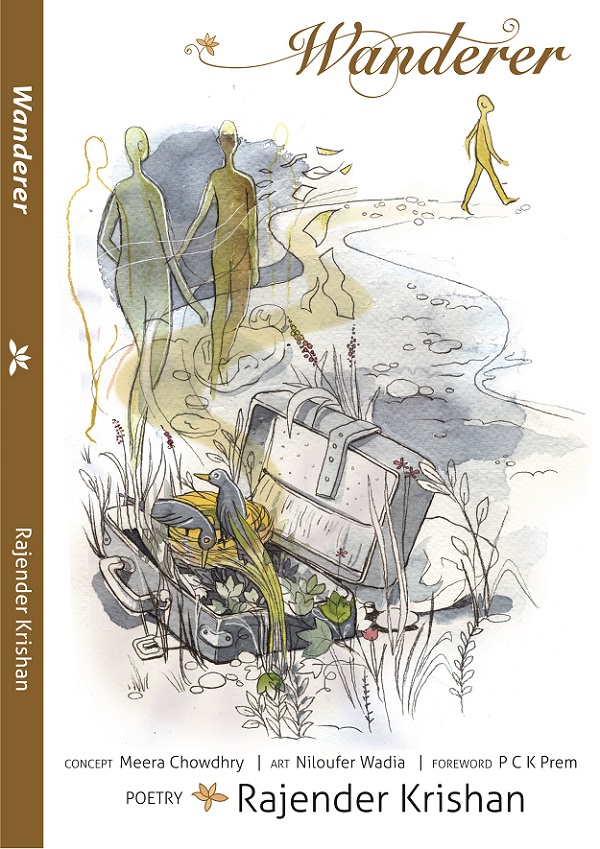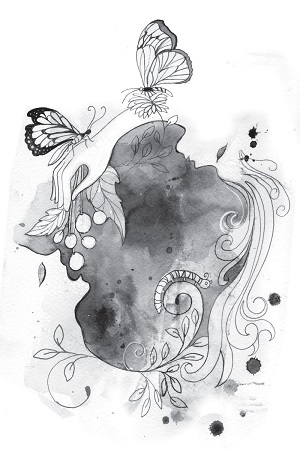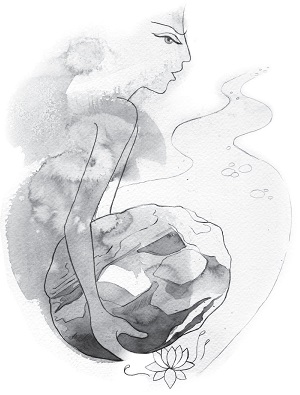Apr 21, 2025
Apr 21, 2025
by Hema Ravi
Wanderer by Rajender Krishan
Paperback ISBN : 978-1-947403-15-4 Amazon ebook ASIN : B08T7VS8DZ
Available on Amazon USA | Amazon India
 The title ‘Wanderers’ instantly flashes thoughts of William Wordsworth’s immortal lines - ‘I wandered lonely as a cloud….’ referring to the wandering without a purpose until the poet spies ‘a host of daffodils.’ Although the wanderings of poet Rajender Krishan appear to begin aimlessly ‘with a churning of fleeting thoughts,’ it primarily aims to ‘ascertain the destination;’ in Wordsworthian language, to feel that ‘bliss of solitude.’
The title ‘Wanderers’ instantly flashes thoughts of William Wordsworth’s immortal lines - ‘I wandered lonely as a cloud….’ referring to the wandering without a purpose until the poet spies ‘a host of daffodils.’ Although the wanderings of poet Rajender Krishan appear to begin aimlessly ‘with a churning of fleeting thoughts,’ it primarily aims to ‘ascertain the destination;’ in Wordsworthian language, to feel that ‘bliss of solitude.’
In the introductory poem, ‘Inexpressible’ the poet believes it is ‘best to remain nestled/as the eternal witness,’ in other words remain in ‘sakshi bhava.’ Even while remaining muted as witness, the ripples of the mind reflect, reminisce and voices the soul-connect with ‘the parent who has long been gone’ and the mother ‘always caring eternally vigilant.’
The reader is intrigued by the ‘vagaries’ of the mind in ‘Conscience’ that flashes images of doubts, apprehensions, reluctance, resistance, and acceptance among others, the quelling of which reveals the ‘apparent Self.’ The questioning continues with terse lyrical statements in ‘Opinion’ - ‘One wonders, /if there is a power on earth/ stronger than one’s own mind/that can give blissful joy/or is there another devil/that can give pain worse than /what gets inflicted/ from the enemy within?
In Creativity, the poet expresses how the ‘moods’ in the voyage of discovery, leads from the gross to the subtle into the sublime layers; “Poetry's work is not simply the recording of inner or outer perception; it makes by words and music new possibilities of perceiving.” (Jane Hirshfield). The concluding lines in the poem ‘having experienced such a transcendence…,’ yet again reminds the reader about the transcendental imagery of the Romantic poet William Wordsworth, particularly, when the poet describes ‘cosmic diversity’ as impeccably ‘perfect, beautiful, exotic, delicate, erotic, effulgent in its own brilliance.’
 The poet has hit the bull’s eye in ‘Crux’ with these compelling lines:
The poet has hit the bull’s eye in ‘Crux’ with these compelling lines:
‘Inferences are harbingers of desire
Causing action to acquire and require
Fear of loss breeds the habit of greed
Gluttonous ego sows a personal seed ….’
‘All the world’s a stage, And all the men and women merely players…’ is an oft heard line in social discussions. In the poem ‘Insights’ the poet commences with the ‘world as stage’ and goes on to assert: Enamored, it matters not/ if the glass is raised /as a tribute/ to the rains of pleasure /Or drowned agonizingly /in the floods of sorrow. It pays to face challenges with courage and determination, nothing is gained in lamentation!
The poems ‘Flawless’, ‘Debate’ and ‘Transformation’ bring out the emotional intelligence aka state of ‘shithapragnya’ where every man is a ‘performer’ who comprehends and unquestioningly adheres to ‘instruction,’ unperturbed by ‘excellent speeches’ that talk about the rudimentary aspects of life, and eventually, the ‘burdened typecast’ metamorphoses into a ‘liberated self.’ Poet Rajender Krishan hurls a caveat about vanity in discussions and dialogues - ‘the sensible discussion transformed into a competition, inviting Ego and tossing Morality out of the window.’
Mysticism as one knows is the intuitive experience of the Divine through unifying love. The poet’s interest in mysticism and philosophy is evident and abundantly expressed in this poetic collection. Use of phrases such as ‘egoistic albatross,’ ‘mystic unknown,’ ‘wandering mystic,’ ‘meditative mystic’ ‘pristine glory’ ‘mystic warrior,’ among others have the soporific effect of rhythmic chants, which also have a therapeutic effect on the chaotic mind.
Condemning hypocrisy, the poet’s lets out a clarion call in ‘Sly’ even as he asserts: ‘When mind wanders elsewhere /insincere becomes the prayer, /Blame not the chosen deity /that ignores the phony piety.’ The need for walking the talk is further highlighted in the last lines of the poem - ‘Talk not of doctrines or morality/ if practicing not, what you preach.’ These lines remind me of the Tamil word ‘aram’ (Sanskrit word Dharma) which is of pivotal importance in understanding the path of righteousness and ethical practices. Further, the poet’s quest for truth is continuous; he feels blessed in the lap of ‘Mother Earth,’ and bows in ‘reverence’ to anything that takes him closer to the ‘Unknown.’
‘Wanderer,’ which is also the title of this marvelous poetic collection talks about the uncertainties and unpredictable nature of human existence…. this poem is topical and relevant in today’s scenario when the deadly pandemic continues to threaten the very existence of Man. Acceptance of the new norm and lifestyle modifications continues to be the therapeutic sine qua non; moreover, the poet earnestly desires to ‘empty the trunk of cravings,’ and begin the journey ‘unsullied.’ ‘Walk and wander with me on the new voyage’ is the message conveyed that implies that ‘Change is the only constant’ as expounded by Heraclitus, the Greek philosopher.
 Ambling in the labyrinths in ‘Consider’ the poet talks about the ‘proverbial ploy’ - ‘a stone on the way/ makes one stumble, then, a wise man who has a thought for another would tactfully remove it to prevent others from’ tripping.’ Contrarily, the unwise would kick and get hurt and continue to limp on ‘mindlessly.’ Deep-rooted philosophy of life has been expressed in ‘Learning’- ‘Life teaches/ in her own /mysterious ways. / No one is spared.’ As the adage goes-as you sow so you reap! In the same verse, the lines ‘When in doubt /worry not. It compels, /one to translate, / contemplate, meditate.’
Ambling in the labyrinths in ‘Consider’ the poet talks about the ‘proverbial ploy’ - ‘a stone on the way/ makes one stumble, then, a wise man who has a thought for another would tactfully remove it to prevent others from’ tripping.’ Contrarily, the unwise would kick and get hurt and continue to limp on ‘mindlessly.’ Deep-rooted philosophy of life has been expressed in ‘Learning’- ‘Life teaches/ in her own /mysterious ways. / No one is spared.’ As the adage goes-as you sow so you reap! In the same verse, the lines ‘When in doubt /worry not. It compels, /one to translate, / contemplate, meditate.’
The contemplation and continuous deliberation help to find the solution, in other words, the subconscious mind is able to offer solutions that are impossible to the mind in the waking state.
An interesting anecdote that I would like to share here is about the discovery of Benzene by August Kekulé. Unable to understand how the atoms in Benzene are arranged, he sat beside the fire and dozed off. In his dream, atoms started ‘dancing’ and ‘arranged themselves into the shape of a snake.’ Finally, he gained the insight that the molecules are made up of ‘rings of carbon atoms.’
‘Presumptions’ evokes subtle humor, while highlighting the unnecessary anxiety behavior of emotional individuals – ‘Not hearing from someone /dear and known for a long time/ does not authorize me to/ Enter imaginations and conclude/ that the fellow has taken the ferry/ on a journey to the world beyond./’ These lines remind one of the oft-used phrase - no news is good news!
Talking about ‘Duty,’ the poet goes on to explain - Duty must be rightly performed/ whether it is peace or tumult. Again, in ‘Attitude’ the poet, by way of instruction points out : ‘React not /inanely to make the situation dire/ resiliently respond, /the mess will appear minor.’
‘Ponder’ truly makes one pause and contemplate: The glass is hall full; Stop tossing and turning debating inanely, if it is semi empty or demi full as also ‘Virtue’ in these lines when the poet wants one to count the blessings: ‘Whatever comes is/ entitlement of labor /bestowed by His grace.’
‘Fake’ is yet another candid verse that brings out the persona of the poet - ‘Ever quizzed/ the idea of sophistry/ compelling one/ to adorn a mask for/ converting persona /to hide deceptiveness?’
‘When facing failure,/ ask yourself, if you are /satisfied with the intent/ and the effort you have put in…’ These lines in ‘Failure’ are rather brutal, but it reveals answers that enable course correction to overcome inadequacies. Pampering the ego leads nowhere, only an ‘honest answer’ helps to let the situation pass. Similarly, in the following verse, ‘Being worrisome/ leads to wearisome/ Habitual anxieties /breed misery,’ the poet believes in positivity and promptness not in ‘pointless work.’ Experience is the best teacher; the oft heard cliché is evident in some of the poems that have an autobiographical sketch highlighting the poet’s professional and personal life.
His love for nature and all living beings has found place in verse form in ‘Coby,’ ‘The Maple Tree,’ ‘Tree of Life,’ ‘Naissance,’ among others. Philosophical truths of life emerge in ‘When’ and this verse empowers one not just to deliberate on the realities of the present, the transient nature of life forms, but also to ‘feel gratified’ and ‘patiently await the ultimate moment’
Poet, photographer and art lover, Rajender Krishan, is a staunch believer of freedom of expression and truth is evident in this poetic collection that is filled with sensitivity, truth, openness, and rationality, even while proving to be a panacea for ills of the mind. Additionally, the artistic sketches by renowned artist Niloufer Wadia are aesthetically appealing – the illustrator has brilliantly reflected the poet’s thoughts precisely in images.
The poems in this collection have earnestly attempted to ‘reign the wild horses galloping in the mind’s racecourse’ in the turbulent times we live in; accept and adapt to the ‘new normal’ in the best possible manner with confidence and courage. The thoughts expressed in this poetic collection will enable earnest seekers of truth to find answers to some of their own existential truths in the chaotic world around us, and leave them invigorated, resilient and blissful.
More on Wanderer
06-Mar-2021
More by : Hema Ravi